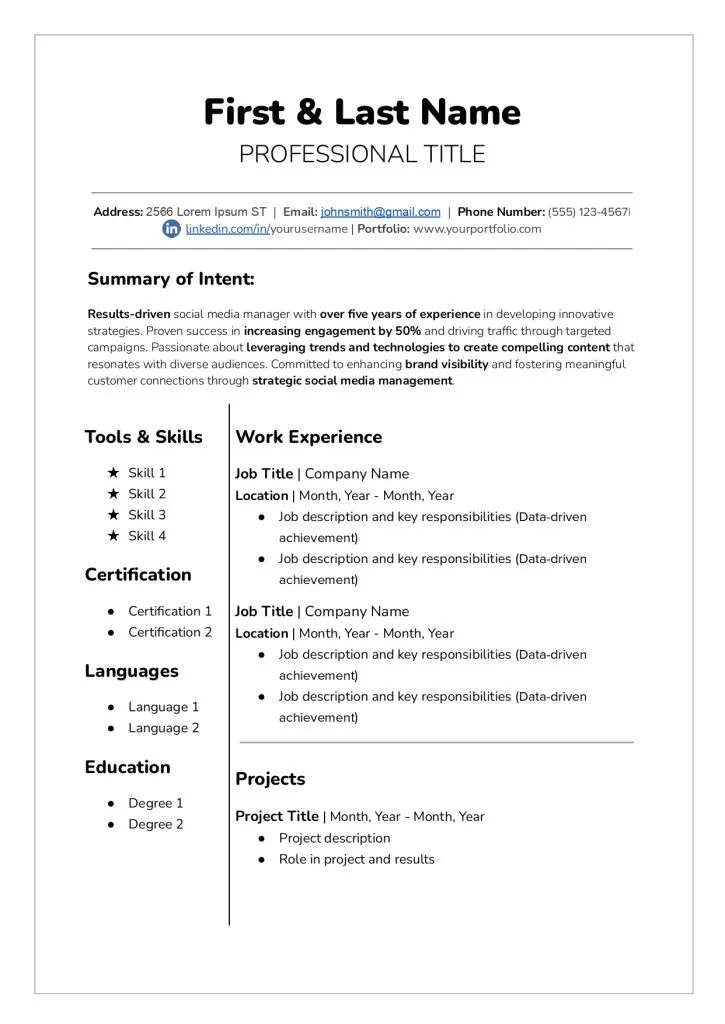How to Create a Resume for Social Media Managers: Tips & Tricks

The job market is competitive, and standing out as a social media manager needs more than a resume that just your work history. Recruiters want to see creativity, strategic thinking, and adaptability all in one document. Social media management has grown beyond posting content. Today, it’s about building communities, staying ahead of trends, and proving results with data. This guide will walk you through what to include in your resume, how to structure it, and the latest skills that make employers take notice.
What is a Social Media Manager?
A social media manager is responsible for shaping how a brand shows up online. The role shifts constantly with platform updates, algorithm changes, and new features rolling out all the time. That means social media managers have to stay curious, flexible, and willing to test new approaches. At its core, the job blends creativity with analysis: crafting posts that people want to engage with while tracking performance to guide the next move.
The key responsibilities of a social media manager include:
- Content Creation: Producing posts, graphics, and videos that connect with the audience, often in collaboration with creative teams.
- Social Media Strategy: Planning campaigns that build awareness, grow followers, and boost engagement while adjusting based on results.
- Analytics: Using tools like Metricool or Google Analytics to measure engagement, impressions, and conversions.
- Community Management: Responding to comments and messages, handling concerns, and keeping the audience connected.
- Paid Advertising: Running paid campaigns and managing targeting, budget, and performance.
- Crisis Management: Monitoring brand reputation and responding effectively to potential issues.
What to Include in a Social Media Manager Resume
Professional Summary
Open with a short introduction that highlights your strongest skills and achievements. Think of this as your elevator pitch in writing.
Focus on:
- Results you can measure: Example: “Boosted engagement by 40% in six months with targeted campaigns.
- Your specialty: Maybe you shine in influencer partnerships, content strategy, or community building.
- Unique strengths: Skills that make you stand out, such as video editing or experience with social listening tools.
“Creative and data-driven Social Media Manager with over 5 years of experience in growing online communities, increasing engagement rates by 40% through personalized content strategies. Expert in cross-platform integration, AI-driven analytics, and paid social media campaigns across TikTok, Instagram, and LinkedIn. Adept at using social listening tools to drive real-time engagement and brand awareness.”
Core Skills
Social media managers need a mix of technical abilities and people skills. Here’s what to include:
Technical Skills:
- Platform Knowledge: TikTok, Instagram, LinkedIn, YouTube, and more.
- Content Tools: Adobe Creative Cloud, Canva, CapCut, Metricool.
- Analytics Platforms: Metricool, Google Analytics, Meta Insights.
- Paid Mds Management: Meta Ads, LinkedIn Ads, TikTok Ads Manager.
Soft Skills:
- Building communities and engaging audiences.
- Handling difficult feedback or online reputation challenges.
- Working with marketing, design, or sales teams to keep campaigns consistent.
Work Experience
When describing past roles, focus on achievements rather than just tasks. Show what you accomplished and back it up with numbers.
- Start with Action Verbs: Use verbs like “managed,” “developed,” “executed,” or “increased.”
- Include Metrics: Quantify your results. For example, “Increased follower count from 10,000 to 50,000 within 6 months by launching a viral Instagram campaign.”
- Highlight Cross-Department Collaboration: Describe how you’ve worked with marketing, PR, or creative teams for successful campaigns.
- Show Adaptability: Mention how you stayed up to date with platform changes or algorithm updates and how you pivoted when changes occurred.
Education and Certifications
Experience usually carries more weight, but certifications and courses show you’re serious about staying current. Add:
- Digital marketing certifications.
- Training in storytelling or content marketing.
- Platform-specific badges.
- Degrees in marketing, communications, or related fields.
Adding a mix of practical experience, measurable results, and relevant certifications creates a resume that tells a complete story about your skills, growth, and adaptability as a social media manager.
Social Media Manager Resume Example

Summary: Start with a brief statement at the top, including relevant keywords like content strategy, community management, paid campaigns, or analytics. This gives busy recruiters a quick sense of your focus and expertise.
Sidebar: Make it easy to scan tools and platforms you have experience in, skills, certifications, languages, and education. You can also add small wins, key metrics, or personal campaigns to showcase impact at a glance.
Work Experience and Projects: Detail your achievements with numbers and examples, such as “Grew Instagram followers from 15,000 to 50,000 in six months” or “Increased LinkedIn engagement by 60% with targeted campaigns.” Highlight teamwork, cross-platform projects, and your ability to adapt to trends and platform changes.
Optional Sections: If you have extra space, include personal interests or hobbies that relate to the company’s culture. For example, if you’re applying to a gaming company, list your favorite video games or communities you follow. Volunteer work or causes you support can also be valuable, especially when applying to a nonprofit or socially focused organization.
Other ideas to include:
- Side projects or personal campaigns: Show initiative by including blogs, social channels, or campaigns you’ve run independently.
- Awards or recognitions: Any accolades, like “Social Media Campaign of the Year,” help your resume stand out.
- Speaking engagements or workshops: If you’ve presented on social media trends or taught courses, this demonstrates authority in your field.
- Portfolio links or case studies: Include links to highlight visual examples of your work, campaigns, or analytics dashboards.
This structure keeps your resume easy to read while giving a full picture of your skills, experience, and personality. It shows recruiters that you have both the technical abilities to manage social media and the creativity and initiative that make your work memorable.
The goal is to highlight your best professional self, not just fill space, so every detail supports your experience, achievements, or fit for the role. Personal touches make your resume feel approachable while still showing why you’re the right candidate.
10 Emerging Trends to Highlight on your Social Media Resume
If you want your resume to feel current and stand out to recruiters, it helps to show you’re tuned in to the latest changes in social media. Here are ten areas worth highlighting:
1. AI and Automation Proficiency
AI tools like ChatGPT, Jasper, or Canva’s Magic Write are now part of daily workflows for many social media managers. Show how you have used them to create content, schedule posts, or pull insights from data while still keeping the human touch in your work.
2. Video Content Expertise
Short videos continue to dominate feeds across platforms. Mention your experience with TikTok, Instagram Reels, or YouTube Shorts, and list editing tools you know such as Adobe Premiere, CapCut, or InShot.
3. Social Commerce Experience
Social platforms are increasingly doubling as shopping hubs. If you have worked with Instagram Shopping, TikTok Shop, or Facebook Marketplace, highlight how you used these features to drive sales or conversions.
4. Data Privacy and Compliance
Privacy rules like GDPR and CCPA matter more than ever. If you have managed campaigns with compliance in mind, include that in your resume. It shows you understand both the creative and the regulatory side of social media.
5. Crisis Management in the Digital Age
One wrong post can lead to unexpected backlash. Share examples of how you handled negative comments or reputation challenges, and explain what you did to keep your community engaged through it.
6. Cross-Platform Integration
Brands want consistency across platforms, but each channel has its own quirks, tone, and audience. Highlight campaigns you have run across Instagram, TikTok, LinkedIn, or others, and explain how you kept the strategy cohesive while tailoring content for each space.
7. Influencer Marketing
If you have worked with influencers, talk about the partnerships you managed, the size of their audiences, and what the campaigns achieved. Recruiters like seeing both the relationship-building side and the numbers.
8. Social Listening Skills
Tools like Brandwatch or Mention help spot trends and keep a pulse on audience conversations. If you have used them to adjust strategy or respond in real time, that is worth pointing out.
9. Inclusive Marketing Expertise
Representation matters in digital spaces. If you have created campaigns that connected with diverse audiences, make space for this on your resume. It shows awareness and the ability to reach a wider community.
10. Storytelling Abilities
Social media is about more than posting content. Strong storytelling makes people remember your brand. Mention your experience shaping narratives across different formats, from blog posts to short captions, and how they connected with audiences.
Social Media Manager Resume Tips
- Start with a Strong Summary: Open with a short introduction that quickly shows your value to employers. This should highlight your best skills and achievements.
- Quantify Achievements: Metrics give weight to your experience. Mention follower growth, engagement rates, or ROI to prove the impact of your work.
- Tailor Your Resume: Pull in the skills and keywords from each job description. A customized resume is more likely to grab attention.
- Keep It Concise: If you have less than 10 years of experience, aim for a single page. This makes your resume easier to read and keeps the focus on what matters.
- Highlight Relevant Skills: List the technical tools you use as well as people skills like creativity, communication, and collaboration.
- Showcase Your Experience: Use reverse chronological order and start bullet points with strong action verbs like “managed,” “developed,” or “increased.”
- Add Professional Links: Include your social profiles or an online portfolio to show your work in action.
- Proofread for Errors: Even small typos can make a bad impression and taking an extra five minutes to proofread can make all the difference. Double-check before sending.
- Be ATS-Compatible: Choose a clean layout and standard fonts so applicant tracking systems can scan your resume without issues.
- Demonstrate Adaptability: Mention how you have handled platform updates, algorithm changes, or new trends. Employers want to see that you can adjust quickly.
Metricool to Support Your Social Media Manager Journey
Creating a strong resume is only the first step for a social media manager. Once you land the role, having the right tools makes it easier to turn your ideas into results. Metricool helps you plan and schedule content, track performance, and generate reports that clearly show your impact. It’s a practical way to put your skills into action every day.
Using Metricool lets you stay organized, monitor growth, and adapt your strategy with real data. With the right tools supporting you

